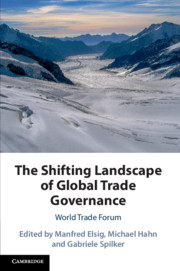Book contents
- The Shifting Landscape of Global Trade Governance
- The Shifting Landscape of Global Trade Governance
- Copyright page
- Contents
- Figures
- Tables
- Contributors
- Preface
- Abbreviations
- 1 Introduction
- Part I New and Old Challenges
- Part II Trade Policy and Trade-Related Concerns
- Part III Development Angles
- 11 The Trade-Migration Nexus from a Multilevel Perspective
- 12 TRIPS Implementation in Developing Countries
- 13 Investment Promotion and Facilitation for LDCs
- Part IV Diffusion across Economic Treaties
- Index
- References
12 - TRIPS Implementation in Developing Countries
Likely Scenarios to 2025
from Part III - Development Angles
Published online by Cambridge University Press: 05 August 2019
- The Shifting Landscape of Global Trade Governance
- The Shifting Landscape of Global Trade Governance
- Copyright page
- Contents
- Figures
- Tables
- Contributors
- Preface
- Abbreviations
- 1 Introduction
- Part I New and Old Challenges
- Part II Trade Policy and Trade-Related Concerns
- Part III Development Angles
- 11 The Trade-Migration Nexus from a Multilevel Perspective
- 12 TRIPS Implementation in Developing Countries
- 13 Investment Promotion and Facilitation for LDCs
- Part IV Diffusion across Economic Treaties
- Index
- References
Summary
This chapter sketches future scenarios of TRIPS implementation in developing countries by looking at past experience and current trends, and by comparing historical and cross-country patterns. The chapter focuses on the three largest emerging economies - Brazil, India, and China (BICs) - because they have the highest potential to shape the intellectual property regime. The chapter finally draws some lessons from these previous experiences to suggest what the likely positions of the BICs will be on TRIPS implementation up to 2025.
- Type
- Chapter
- Information
- The Shifting Landscape of Global Trade GovernanceWorld Trade Forum, pp. 275 - 294Publisher: Cambridge University PressPrint publication year: 2019
References
- 5
- Cited by



